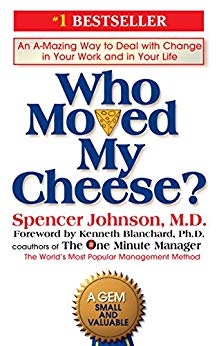

This article is an excerpt from the Shortform summary of "Who Moved My Cheese" by Spencer Johnson. Shortform has the world's best summaries of books you should be reading.
Like this article? Sign up for a free trial here .
Change is inevitable, but it can be addressed successfully. What are the best methods of coping with change?
Dealing with change involves practicing a few key principles: anticipate and prepare for change, overcome fears, envision success, and enjoy change. Here’s a guide on what to do, and what not to do, when coping with change.
A Guide to Coping with Change
How to deal with change successfully:
Step #1
Be prepared for change: Pay attention to signs of change in your environment, whether it’s layoffs at your workplace, new aches and pains, or strains in your home life. Consider how potential changes could affect you and develop a plan to handle them – for instance, by learning new skills. This is key to dealing with change.
- In the story: Mice Sniff and Scurry noticed the cheese stockpile getting old and dwindling. They were ready (they kept their running shoes handy) to search for a new supply when the old one disappeared.
Step #2
Let go of the past: When things change, move forward quickly. The longer you wait, the more resistance you build to moving, and the harder it’ll be to adapt later. This is an important step in learning how to cope with change.
- In the story: Sniff and Scurry were action-oriented, and set off immediately to search for new cheese. It helped that they also kept things simple and didn’t overanalyze or overcomplicate things by, for instance, getting hung up on “what if’s.”
- In the story: Initially, Haw also stayed with Hem and wished for things to return to normal. But Haw came to his senses and realized the world had changed, and he had to change with it. Later he concluded that adapting to change is easier the less you wait.
- Many people who finally muster the courage to leave a job or relationship that’s not working for them, often wonder in retrospect why they hadn’t made the change sooner.
Step #3
Adapt—Be open-minded to new things: There are always experiences and opportunities available beyond those you are currently familiar with. You might like them even more than what you used to have. Remember this when dealing with change.
- In the story: Haw found bits of new kinds of cheese (eg brie instead of the cheddar he was used to), and he tried them and liked them. This gave him confidence to keep pushing forward to even better experiences. (He tried sharing the new types of cheese with Hem but Hem rejected them, saying he wanted only the types he was familiar with.)
Step #4
Imagine success: Envisioning what success looks like, and imagining yourself succeeding, can improve your attitude. When you think about what you will gain, rather than what you are losing, you realize change can be for the better, an important understanding in learning how to deal with change.
- In the story: Haw at first imagined Sniff and Scurry enjoying new cheese, then he imagined himself, in realistic detail, sitting in his own pile of all kinds of new cheeses. This vision motivated him to keep pushing forward to find new cheese.
- When you imagine success, paint a picture in your mind of vivid detail. Think about how you’d behave in this new successful world. Imagine how you feel and how other people feel.
Step #5
Handle your fears: Fear can have one of two effects: 1) It can paralyze you, if you imagine all that can go wrong if you leave your familiar ground, or 2) it can spur you into action if you fear that things will get worse if you don’t do something. The second fear is productive and healthy. Distinguishing the effects is part of dealing with change effectively.
- In the story: Haw feared not finding new cheese if he ventured out into new areas of the maze. But he also realized he definitely wouldn’t find any by staying put. He asked himself, “What would you do if you weren’t afraid?”
Step #6
Learn to enjoy change: New experiences, discoveries, and achievements are rewarding, usually more so than continuing to do the same things. This is important to remember when coping with change.
- In the story: Once Haw started searching for new cheese, he realized he felt better just from taking action, and he soon began to enjoy the adventure — he hadn’t realized how complacent he’d gotten from sitting around at the old cheese pile. The key to enjoying change was that he had changed — first his attitude, and then his behavior.
Step #7
Be prepared for continuous change: Change is a natural part of life. Change should only be a surprise if you aren’t paying attention, or if you’re operating on erroneous assumptions — for instance, that you’re entitled to having things a certain way. Knowing change is inevitable is key to learning how to deal with change.
- In the story: After finding the new cheese at the end of the book, Sniff and Scurry expected and prepared for even more change by continuing to explore new parts of the maze. Haw did the same thing because he had learned from his mistakes and pledged not to be surprised by change again.
Dealing with Change, the Wrong Way
What not to do when dealing with change:
How NOT to Deal with Change: Mistake #1
Don’t ignore change and wait for things to return to “normal:” When change happens, it’s natural to hope initially that things will return to the way they were. But if the world really has changed, the longer you entertain that false hope, the more difficult it will be for you to move forward again. Remember this in learning how to cope with change.
- In the story: Long after Sniff, Scurry, and finally Haw had moved on, Hem refused to accept that the old cheese was never coming back. He was acting against his own interests because he was growing ever hungrier while waiting for the old cheese to reappear.
Mistake #2
Don’t try to bring back the past: Sometimes people react to change by working harder in the hope they can stem the tide of change. But that approach is futile. What used to work may no longer work in the new situation. Move forward when coping with change.
- In the story: Hem and Haw decided the cheese must still be around somewhere and had just moved a little. So they banged a big hole in the wall to see if the cheese was behind it, which of course it wasn’t. (Haw made the somewhat funny but true observation that there’s a difference between activity and productivity.)
- Practically, this might mean:
- If you’re about to be laid off for larger economic reasons, trying harder to do your job might not rescue your job. And finding the same job elsewhere might be worse than learning new skills to transition to a new job.
- Approaching a broken relationship the same way you always have won’t rescue it.
Mistake #3
Don’t complain about the unfairness of it all: When change impacts you, it’s easy to get hung up on the “unfairness” of having your work or home life disrupted. But if you get stuck on that thought, you’ll end up hurting yourself. Fair or unfair, the change has happened. Now you have to deal with it.
- In the story: Hem and, initially, Haw complained bitterly about how unfair it was that someone had taken “their” cheese, which they felt they had earned in perpetuity. But that didn’t bring them new cheese, only a growing hunger.
Mistake #4
Don’t refuse to adapt: Resisting inevitable change might feel satisfying for a brief period, but staying static in the face of change could eventually lead to extinction.
- In the story: Hem refused to try the new types of cheese that Haw offered to share with him, and he refused to join Haw on the search for new cheese. Hem simply liked his old cheese and just wanted it back.
- If your job is gradually disappearing for larger technological or economic reasons, refusing to learn new skills could mean having no job at all in the future.
Coping with change is difficult, but these steps can make change the way you think about change, making dealing with change easier.
———End of Preview———

Like what you just read? Read the rest of the world's best summary of "Who Moved My Cheese" at Shortform . Learn the book's critical concepts in 20 minutes or less .
Here's what you'll find in our full Who Moved My Cheese summary :
- The absolute worst thing to do when change is coming
- How to adapt to change, like the key characters
- How to handle change in work and life






